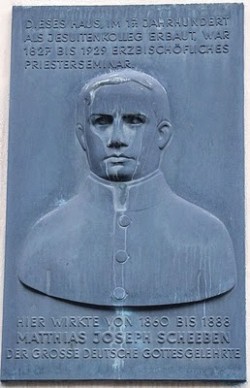
One of my all-time favorite theologians is Matthias Joseph Scheeben (pronounced: “shay-ben”), an obscure German theologian who lived in the 19th century. I want to post up some of what he has said about the mysterious dimension of the Christian faith. Before I do that though, a little bio.
Biography
Eugene Druwé gives a short biography of Scheeben in the a preface to Scheeben’s two volume work on Mariology.[1] Scheeben was born in 1835. He had already finished studying the humanities at age 17 and, upon completing his studies, entered the seminary at Cologne.[2] Because of his extraordinary talents, he was sent to Rome for his seminary studies.[3] He spent the next seven years as one of the students at the Collegium Germanicum.[4] Scheeben was ordained a priest on December 18, 1858.[5] He went on to teach as a doctor of theology in the seminary of Cologne.[6] His first work was a German translation of the early Fathers.[7] He completed his first book, Nature and Grace, in 1861.[8] In 1863 he wrote The Splendors of Divine Grace.
However, Scheeben’s magnum opus is his treatise on the supernatural mysteries, entitled The Mysteries of Christianity. The book is truly a masterpiece. It offers a synthesis of all the Christian mysteries, highlighting the inner-coherence of the Christian faith. I will be quoting from one of my favorite sections in it in the following posts in this series, namely, his treatment on the “mysterious” dimension of Christianity.
Scheeben died in 1888. At the time of his death he had not completed the revised edition of this book. His friend Benjamin Herder published the final edition in 1941, which was “scrupulously reconstructed from his notes”.[9]
Theological Approach
As mentioned above, Scheeben wanted to show how the supernatural mysteries were inextricably connected.[10] His theological system, therefore, looks at each of the supernatural mysteries as part of a larger whole. Scheeben writes:
“The light derived from the consideration of each separate mystery spreads automatically far and wide over the inner relationship and the wonderful harmony pervading them all, and thus the individual pictures take their places in an orderly gallery, which comprises everything magnificent and sublime that theology possesses far in excess of all the other sciences, including even philosophy.”[11]
Scheeben, therefore, believed that to properly understand each individual mystery the theologian must see how it relates to the other mysteries. Much more could be said about this, but, in this short post, I’ll just mention that in particular Scheeben emphasized the essentially Trinitarian nature of Christian theology.
Growing Recognition
Though Scheeben’s work was first received with much criticism[12], an interest in his work emerged years later. Indeed, major theologians have pointed to Scheeben as a shining light. For example, Hans Urs von Balthasar, stated confidently that he was “the greatest German theologian to date. . . a milestone.” [13]
Indeed, back in 1935, on the centennial anniversary of Scheeben’s birth, Pope Pius XI encouraged the students of the Germanicum to study Scheeben’s theology. In an audience with the students the Pope said, “The entire theology of Scheeben bears the stamp of a pious ascetical theology; as another great theologian, Franzelin, said: ‘I like ascetical books with much theology and dogma, and dogmatic books with much asceticism.’ This is as it should be.”[14]
As I understand it, a new book is also about to be released by Aidan Nichols exploring his work. I sincerely hope that Nichols’ treatment helps to raise interest in Scheeben’s very beautiful theology.
NOTES
————————————————————————————————————————
[1] Aidan Nichols, Scribe of the Kingdom: Essays on Theology and Culture. (London: Sheed and Ward, 1994), 205. [2] Preface by Eugene Druwé in Matthias Joseph Scheeben, Mariology (2 vols.; trans. T. L. M. J. Geukers; St. Louis: B. Herder Book Co., 1946), 1:iv-v. [3] Druwé in Mariology, 1:iv-v. [4] Druwé in Mariology, 1:iv-v. [5] Druwé in Mariology, 1:v. [6] Nichols, Scribe of the Kingdom, 207. [7] Druwé in Scheeben, Mariology, vi. [8] Nichols, Scribe of the Kingdom, 207. [9] Nichols, Scribe of the Kingdom, 207. [10] Nichols, Scribe of the Kingdom, 209: “[Scheeben] offered a total overview of the Christian mysteries, aimed at showing the organic interrelatedness of the revealed truths, their wonderful harmony both with each other and with the truths of the natural order to which they are linked, as well as their value for human living, their capacity to satisfy the needs of the human heart.” [11] Scheeben, The Mysteries of Christianity (St. Louis: B. Herder Books, 1946), 21. [12] For example, Wenzeslaus Mattes wrote in reference to The Mysteries of Christianity: “Through the whole work there reigns such an indistictness, confusion, and unintelligibility that it is almost impossible to read it through to the end. So the author will have worked practically in vain; some will read passages in the book, no one, except possibly the critics, will read it through. Even this may be doubtful” (cited in Druwé‘s Preface to Scheeben’s, Mariology, ix). [13] Hans Urs von Balthasar, Glory of the Lord. Vol. 1 (San Francisco: Ignatius Press, 1982], 104. Aidan Nichols likewise states, “Scheeben’s theology is that extraordinary thing, a lyrical Scholasticism, in which the mind in love, while abandoning nothing of its rigour in thinking, does not fear to end its activity in adoration and praise. This is our ‘reasonable worship’ (Romans 12:1): it was for this that the mind of man was made” (Nichols, Scribe of the Kingdom, 213). [14] Scheeben, Mariology, xv.